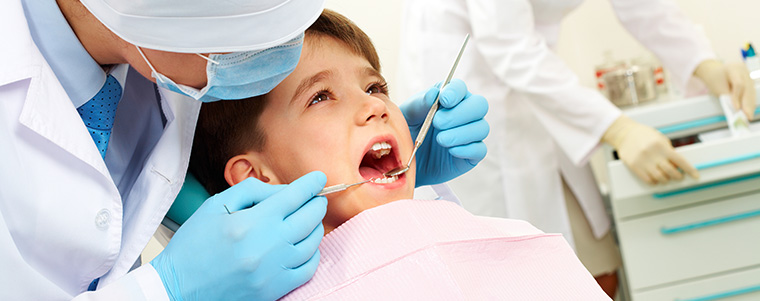
Your baby's first tooth should start erupting (emerging) at 6-9 months of age. However in some cases the first tooth can emerge as early as 3 months or as late as 12 months. Baby teeth continue to emerge until your child is around 27 months, by which time they should have their full set of baby teeth. Children begin to lose their primary teeth between the ages of 6 and 11 years. They are replaced by secondary, or permanent teeth. Your child's first permanent teeth usually erupt behind the primary teeth at about age 6. The last permanent teeth usually erupt between the ages of 12 and 21.
Tooth decay can start as early as 3 years if proper dental hygiene is not maintained. The child needs to be taught the right way to brush teeth and maintain oral hygiene. As your baby grows, they should visit the dentist at around 3 years old or earlier. This ensures the appointment can be positive and preventive, rather than trying to fix problems.
The purpose of first dental visit is to meet you and your child, assess your child's dental status as well as recommend any necessary treatment or advice as required. This consultation mainly involves just a visual inspection, making sure there's nothing unusual with the child's teeth and gums. As well as doing an oral examination, the dentist or dental hygienist assesses the child's growth and development and identifies any risk of dental decay, as well as educating the child (and parent) on brushing techniques and the importance of healthy nutrition on teeth.
Baby bottle tooth decay, also known as early childhood caries, is the name for cavities which occur in young children. Putting a child for sleep with a bottle other than water can cause serious and rapid dental decay. You may be surprised to hear that baby bottle tooth decay is not always caused by a baby sucking on a bottle. Sweet liquid pools (liquids that contain sugar such as milk, breast milk, formula, juice and other sweetened drinks or medications.) around the child's mouth, especially the flow of saliva is reduced during sleep, resulting in rapid destruction of teeth.
Check that your child doesn't carry a full bottle around with them all day or go to sleep with one. Wipe your baby's teeth with a damp wash cloth. Start using a toothbrush once the molars come through, but use only water until your child reaches 18 months.
- Wipe gums with a washcloth after feeding. This will help get rid of the sticky coating called plaque that can cause tooth decay.
- Brush teeth twice a day with water and a soft-bristle toothbrush.
- Schedule first dental appointment before first birthday.
- Start using fluoride toothpaste at age 3. Make sure your child spits it out after brushing.
- Always pay special attention to the back teeth, which may have more plaque.
- Encourage children to drink water, should limit sugary and sticky foods and drinks to protect against tooth decay.
- Parents should consult dentist on finger and thumb sucking habits, ways of preventing injuries to the mouth and teeth, diet information.



